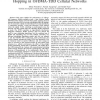Free Online Productivity Tools
i2Speak
i2Symbol
i2OCR
iTex2Img
iWeb2Print
iWeb2Shot
i2Type
iPdf2Split
iPdf2Merge
i2Bopomofo
i2Arabic
i2Style
i2Image
i2PDF
iLatex2Rtf
Sci2ools
140
click to vote
VTC
2008
IEEE
2008
IEEE
Channel Asymmetry and Random Time Slot Hopping in OFDMA-TDD Cellular Networks
Abstract—This paper studies the performance of orthogonal frequency division multiple access – time division duplex (OFDMA-TDD) cellular networks when jointly applying dynamic channel allocation (DCA) and user scheduling under the assumption of asymmetric uplink (UL)/downlink (DL) loads. Specifically, a comparison between a fixed slot allocation (FSA) scheme, where the uplink UL/DL switching is synchronised across the network, and the random time slot opposing (RTSO) technique is made. The RTSO resembles an opportunistic interference mitigation technique. RTSO, however, does not obviate the need for user scheduling algorithms, but the combined use of RTSO and scheduling has not been studied. Therefore, two different scheduling algorithms, greedy and fair, are adapted to suit the OFDMA-TDD architecture. Their performance for various channel asymmetries under RTSO and symmetric FSA is evaluated, based on spectral efficiency and user outage. In order to account for the exposed loca...
Communications | Orthogonal Frequency Division Multiple Access | Scheduling Algorithms | User Scheduling | VTC 2008 |
| Added | 01 Jun 2010 |
| Updated | 01 Jun 2010 |
| Type | Conference |
| Year | 2008 |
| Where | VTC |
| Authors | Ellina Foutekova, Patrick Agyapong, Harald Haas |
Comments (0)

